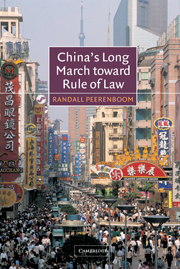Book contents
- Frontmatter
- Contents
- Preface
- List of abbreviations
- 1 Introduction
- 2 The evolution of rule of law in China: the role of law in historical context
- 3 Post-Mao reforms: competing conceptions of rule of law
- 4 Rule of law and its critics
- 5 Retreat of the Party and the state
- 6 The legislative system: battling chaos
- 7 The judiciary: in search of independence, authority, and competence
- 8 The legal profession: the quest for independence and professionalism
- 9 The administrative law regime: reining in an unruly bureaucracy
- 10 Rule of law and economic development
- 11 Rule of law, democracy, and human rights
- 12 Conclusion: the future of legal reform
- References
- Index
6 - The legislative system: battling chaos
Published online by Cambridge University Press: 20 July 2009
- Frontmatter
- Contents
- Preface
- List of abbreviations
- 1 Introduction
- 2 The evolution of rule of law in China: the role of law in historical context
- 3 Post-Mao reforms: competing conceptions of rule of law
- 4 Rule of law and its critics
- 5 Retreat of the Party and the state
- 6 The legislative system: battling chaos
- 7 The judiciary: in search of independence, authority, and competence
- 8 The legal profession: the quest for independence and professionalism
- 9 The administrative law regime: reining in an unruly bureaucracy
- 10 Rule of law and economic development
- 11 Rule of law, democracy, and human rights
- 12 Conclusion: the future of legal reform
- References
- Index
Summary
There are a number of excellent works describing the development of the National People's Congress (NPC).There are also excellent studies of the law-making and administrative rule-making processes, though the procedures have changed to some extent as a result of recent developments in these areas.My purpose here is to examine the legislative system from the perspective of the requirements of rule of law, and in particular a thin rule of law;to illustrate current shortcomings in the system with concrete examples and discuss the reasons for the deficiencies;and to consider various solutions.
As pointed out in previous chapters, China's efforts to create a market economy and rebuild the legal system have resulted in a legislative explosion. More than 350 laws and 6,000 lower-level regulations have been passed since 1978. The Party's diminished role in the law-making process and even more minimal role in the process of creating lower-level regulations has shifted the responsibility for the making of laws and regulations to the NPC, local people's congresses, governments, and administrative agencies. In response, these entities have gained in institutional capacity, professionalism, and stature. With respect to the NPC, the NPCSC has been streamlined and strengthened; the establishment of subcommittees, including the Legislative Affairs Commission, has brought more focus and expertise to the process; there are more and better-qualified staff members to call on for research and the drafting of laws; and NPC delegates are younger, more educated, and more qualified than in the past.
- Type
- Chapter
- Information
- China's Long March toward Rule of Law , pp. 239 - 279Publisher: Cambridge University PressPrint publication year: 2002



